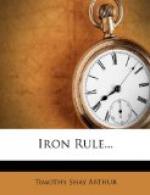By the time Mr. Howland reached the chamber above, to which he repaired with Andrew, the excitement of his anger had subsided; but not his stern purpose in regard to his child, who had again disobeyed him. The absolute necessity of obedience in children he recognized in all its length and breadth. He saw no hope for them in the future unless obedience were constrained at every cost. Happy both for them and himself would it have been if he had been wiser in his modes of securing obedience, and more cautious about exacting from his children things almost impossible for them to perform. Without a law there is no sin. Careful, then, should every parent be how he enacts a law, the very existence of which insures its violation.
Mr. Howland had sought, by various modes of punishment, other than chastisement, to enforce obedience in this particular case. Now he was resolved to try the severer remedy. Andrew had expected nothing farther than to be shut up, alone, in the room, and to go, perhaps, supperless to bed, and he was nerved to bear this without a murmur. But when the rod became suddenly visible, and was lifted above him in the air, his little heart was filled with terror.
“Oh, father!” he exclaimed, in a voice of fear, while his upturned, appealing face became ashy pale.
“You have disobeyed me again, my son,” said Mr. Howland, coldly and sternly, “and I must whip you for it. Disobedient children have to be punished.”
“Oh, father! Don’t whip me! Don’t!” came huskily from the lips of the terrified child. But even while he thus pleaded, the smarting strokes began to fall.
“Now, sir!” at length said Mr. Howland, pausing with the rod uplifted, “will you go into Mr. Winters’ again?”
The child hesitated, and down came a blow upon his tender limbs, followed by the words—
“Say! Will you go in there any more?”
Still there was a reluctance to make this promise, and another and harder stroke was given. The father was resolved to conquer, and he did conquer. A promise was extorted from the child’s lips, while, his heart yielded nothing.
“Very well, sir! See that you keep your word,” said Mr. Howland, as he released the writhing sufferer from his firm grasp. “If you disobey me again in this thing, I will give five times as much.”
And he turned from the chamber leaving the wronged and suffering child alone.
“I’ve begun now, and I’ll go through with it,” muttered Mr. Howland, as he reentered the room where his wife was sitting. “I never saw so perverse and self-willed a child in my life. If he is not subdued now, and forced to obey, his ultimate destruction is inevitable.”
“His fault was not a very great one,” Mrs. Howland ventured to suggest.
“Do you call disobedience a little fault?” asked Mr. Howland, his brow contracting as he spoke.
“I did not mean that,” quickly answered Mrs. Howland. “I meant his going in to see Emily Winters. The children are very fond of each other.”




